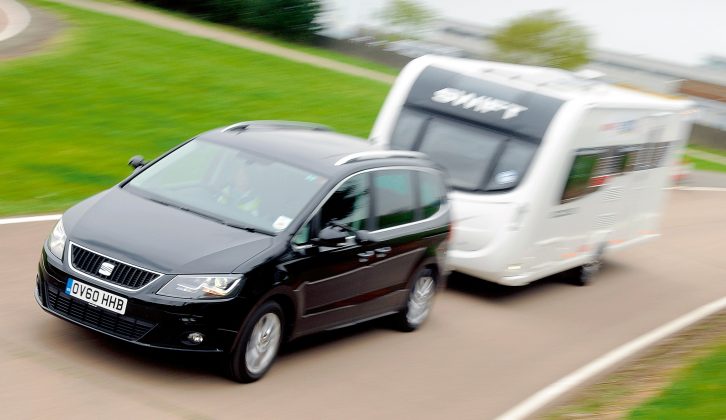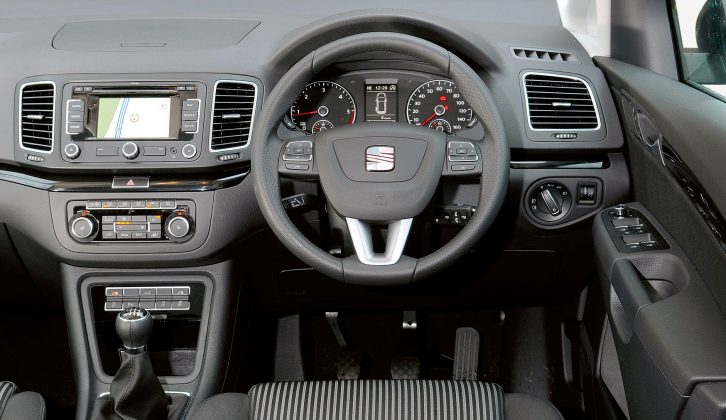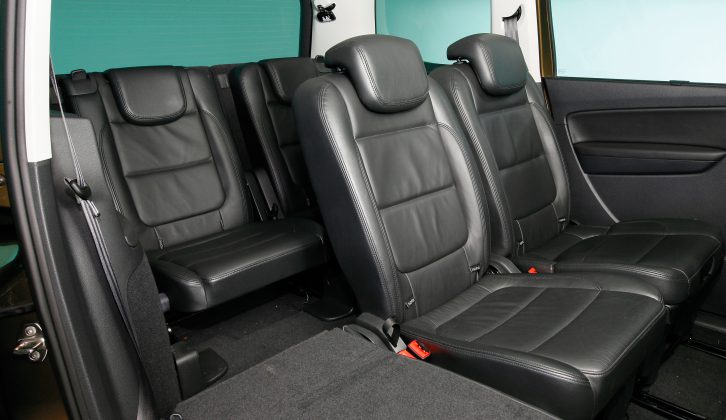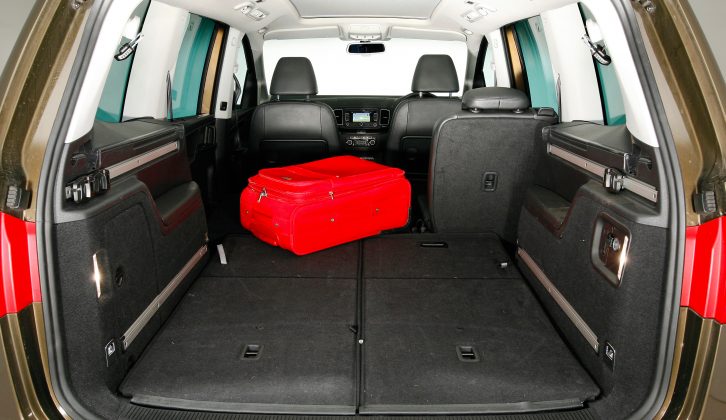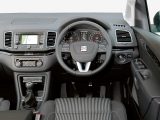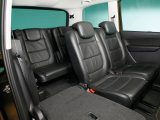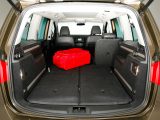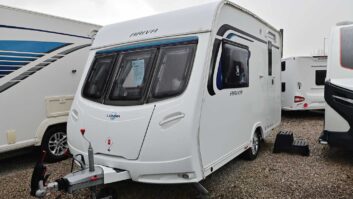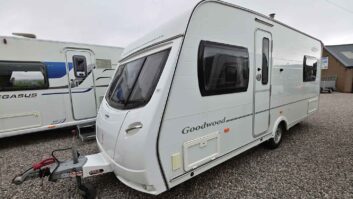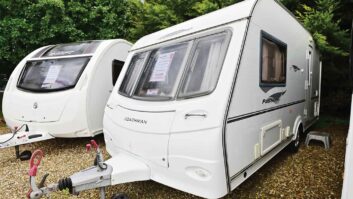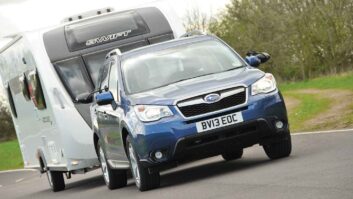There are those who believe that an SUV or estate car are the only vehicles you should choose when wondering what tow car to buy next.
They’re wrong, because the humble MPV is usually bigger than both of them inside, and pretty much guaranteed to make better use of its space.
So which used MPV is the most worthy of consideration?
Well, the second-generation Seat Alhambra was voted MPV of the Year by our sister publication, What Car? for three years in a row.
The range of engines kicks off with a 1.4-litre petrol, which is far more comfortable in a car the size of the Seat Alhambra than you might think.
There is also a 2.0-litre diesel engine that was available with either 138bhp or 168bhp, although over the course of the car’s life, power outputs, efficiency and carbon dioxide emissions have been improved.
Model history
The second-generation Alhambra appeared in 2010 and immediately leapt to the top of the large-MPV class.
For a start, this seven-seat car is vast. With the two rear seats folded away into the floor, there are 1167 litres of space on offer, and if you fold all five rear seats down, the resultant 2297-litre space is truly cavernous.
Getting into and out of the rear seats is a doddle, too, because the two rear-most side doors are sliding affairs, which means they get completely out of the way when open – they also make access easy in tight car park spaces.
The rear seatbacks fold down completely flat, and the vast rear tailgate rises up and out of the way, so sliding large items into the boot is simple.
Front head- and legroom are generous, and there’s plenty of space for odds and ends.
Moving back, the three middle-row seats all slide and fold individually, allowing you to configure people or luggage space as required – there’s also generous space for all three occupants.
At the back, the two rearmost seats have less legroom so are best reserved for children/young teenagers.
There are also plenty of cubbies and door pockets for family detritus, and there are power points for charging phones/tablets.
Equipment is plentiful throughout the range, with all models having three-zone climate control, front and rear parking sensors, an electronic handbrake and Bluetooth connectivity.
SE Lux versions include power-operated sliding rear doors and tailgate, a panoramic glass sunroof, electrically adjustable font seats, sat-nav and a rear-view camera.
What tow car potential?
Of all the engines, the 138bhp 2.0-litre TDI offers the best compromise.
It’s strong enough to haul the Alhambra and a caravan, although rushing is not in its repertoire. It’s a relatively economical thing, however.
This engine was also available with either a six-speed manual gearbox, which is light and accurate, or a six-speed DSG automatic, which is smooth and quick to swap gears.
Given the choice, we’d stick with the manual, but we wouldn’t blame you for choosing the DSG, although we’d counsel against paying a premium for it.
The best news is that the Seat Alhambra is a confidence-inspiring tow car, which is utterly stable on a motorway.
It is also perfectly dependable in an emergency manoeuvre and it stops quickly in a straight line.
Trouble spots
First and foremost, the Seat Alhambra 2.0 TDI is one of the vehicles involved in the Volkswagen diesel emissions scandal.
If the free fix has not been done yet (a quick call to Seat will let you know whether or not it has or hasn’t), you’d be wise to get it done.
Aside from that, the Alhambra has been involved in only one recall throughout its life.
A tiny number of vehicles built between January 27 and 28 in 2015 could have a faulty gas canister for the side airbags.
Seat advised getting this replaced, because injury to the car’s occupants could not be ruled out in the event of it going off, so make sure the remedy has been carried out.
Apart from that, the Alhambra has had no serious issues. The only recurring complaint from owners has been that the instructions for how to replenish the diesel car’s AdBlue system are not clear enough.
Some owners have also complained that the wipers leave a large unswept area at the top middle of the windscreen, but there’s nothing that can be done about this because longer blades can’t be fitted.
Verdict
The Seat Alhambra is a seriously capable towing companion.
It pulls a caravan with confidence, and has an enormous and well thought-out interior to make carrying yourself and all your extras easy.
It was even crowned Best MPV at our Tow Car Awards 2016.
Just make sure that any campsite you’re visiting doesn’t have too many grass slopes, because the Alhambra will struggle.
Also, one of its positives can be a negative: the sheer size that makes carrying you and yours around so easy can give the Alhambra a cumbersome feel in town – if you can find a car with the optional self-parking system fitted, all the better.
If you’re wondering which model from the range is the best for towing, we think it is the 2.0 TDI 140 SE Lux.
This engine offers the best compromise between strength and economy. SE Lux adds power-sliding side doors and tailgate, plus automatic lights.
However, we would avoid the 1.4 S. While the 1.4-litre petrol is fine when the Alhambra is solo, it struggles more when towing a caravan – plus, S trim misses out on kit that makes day-to-day life much easier.
What you need to know
The Seat Alhambra is a decidedly desirable MPV, and its prices reflect that.
A budget of around £7300 is needed for even an early example, but beware that the mileage will be into six figures, and the interior will be battle-scarred.
If you can up your spend to £12,000 you’ll be in the market for a 2013 example with a decent spec and a mileage of around 60-70k.
Pay £16,000 and you’ll be able to get a 2015-16 version with a decent spec and 40k miles.
Here are some useful figures (for a 2015 Seat Alhambra 2.0 TDI 184):
- Kerbweight 1845kg
- Towing limit 2200kg
- Noseweight limit 100kg
- 85% match 1568kg
If you want to fit a towball, according to PF Jones, a Witter flange towbar will be £135.00 and a Witter detachable towbar will cost £227.34, fitting extra.
When it comes to servicing, an interim service is £198.29 and a full service will cost you £289.81, according to quotes from Servicing Stop.
It pulls a caravan with confidence, and has an enormous and well thought-out interior
